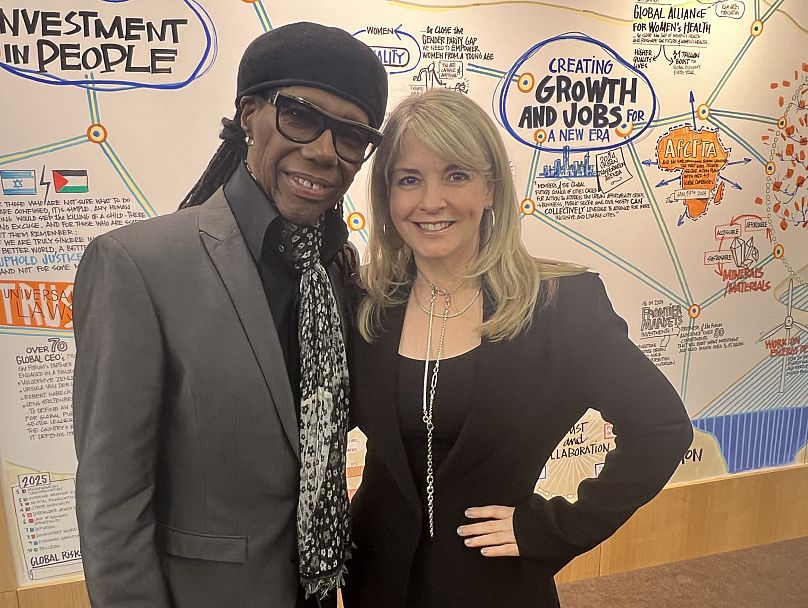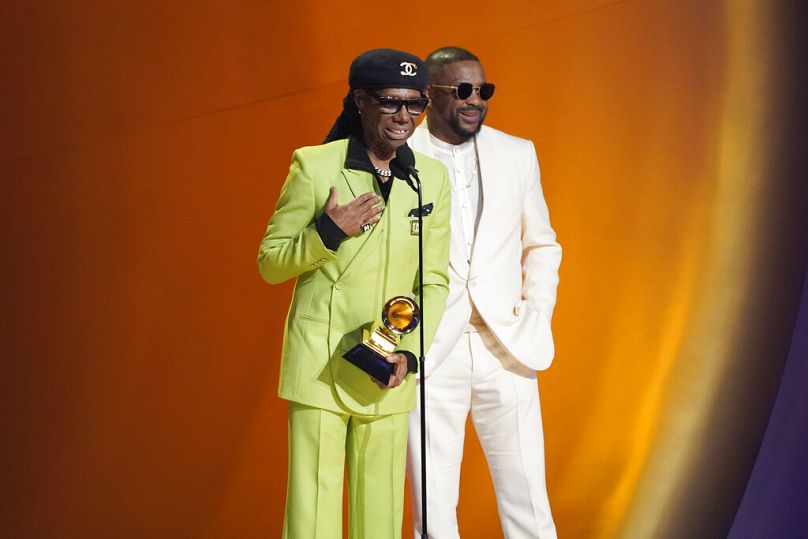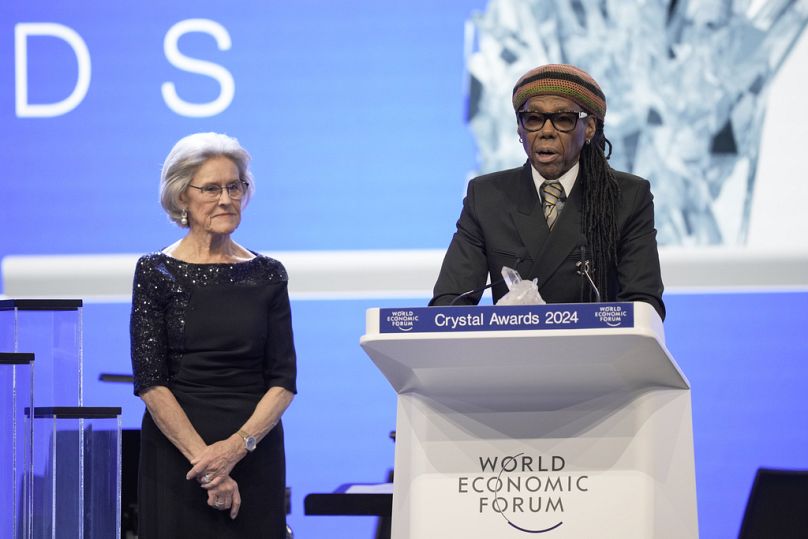Euronews Culture spoke with the legendary Nile Rodgers at Davos 2024, where we riffed about his nonprofit organisation, AI, and the evolving landscape of the music industry.
Record producer extraordinaire. Guitar wizard. Maestro composer. Philanthropist and master storyteller. Nile Rodgers is the very definition of a living legend.
 ADVERTISEMENT
ADVERTISEMENT
 ADVERTISEMENT
ADVERTISEMENT
As the co-founder of the hugely influential disco and funk group Chic, and the creative genius behind chart-topping hits such as Madonna's Like a Virgin, Diana Ross' I'm Coming Out and David Bowie's Let's Dance, Rodgers shaped the sound of the late 1970s and early 1980s.
In total, he has written, produced, and performed on records that have sold more than 500 million albums and 75 million singles worldwide.
But at 71 years of age, his musical journey has far from reached its crescendo. Just last year, Rodgers picked up two Grammy awards, including the first ever lifetime achievement honour and recognition for his work with Beyoncé on her track 'CUFF IT'.
Aside from his musical achievements, he stands as the proud co-founder of the We Are Family Foundation, established in 2002 alongside his partner Nancy Hunt. The foundation is committed to promoting cultural diversity and empowering young individuals globally.
We caught up with the man himself at the World Economic Forum’s annual meeting where he was gearing up to accept the prestigious Crystal Award.
Read our full conversation below:
Euronews Culture: What drives you in life?
Nile Rodgers: Oh my god. So many things. Obviously my job - music. But the foundation also. Working with We Are Family Foundation is the turbocharger in my engine. To be around these inspirational kids - and please forgive me for calling them kids because we started out and they were so young, now they're adults - and they have the drive and determination that just comes when you're young. They inspire me to wake up everyday.
What can we expect from you in the future?
I've just finished a film with John Malkovich. I've just finished a film with Matthew Vaughn, who's an amazing director. And I'm also working on a Blues Brothers West End show with Barbara Broccoli, John Landis, who I did Coming to America with and Dan Aykroyd, who was in the original Blues Brothers.
In 2023, you became the first recipient of a Grammy Achievement Award, in addition to securing another accolade for your current body of work. How did that feel?
That was an incredible moment. I never got into this business to win awards. I just wanted to get one hit record. The fact that I've won so many awards is extraordinary to me.
What is your proudest musical moment?
I've had so many it's really hard to say. Winning awards and all that sort of thing is a big deal. I think the thing that made me feel the most was the first time I got a gold record. Now, the reason why I have to say the first time, is because that can backfire on you. Because we started getting so many that we were now getting used to it like 'Oh, come on, really, we got to carry these things home again this week.' Like at the beginning of my career, it seemed like we were getting a gold or a platinum record, or double platinum, like every other week. It was ridiculous. And honestly, we wound up leaving them at the office half of the time. So that first gold record was just amazing. We didn't think anything like that was possible.
What are your thoughts on AI in music? Is it an exciting advancement or is it the death of the music industry?
So, I think using AI-generated vocals to copy another person's sound is horrible, but using AI to artistically express yourself and make better music, I think, is fantastic. The way I want to look at AI is from the positive side. I want to look at it as just another color on your palette.
I remember when drum machines and synthesisers first came out. But look at how cool the music in the 80s was. It was amazing. A lot of those artists couldn't necessarily play the drums, but they could come up with clever drum patterns. And I remember a lot of people being like, 'Oh man, that's not real music.' No, it was real music. And look, I was one of those people because I was such a purist that when a person played me a record that included a drum machine, I remember arguing with them and telling them how much I didn't like it. And this is how they changed my mind: they went, 'Hey, do you like that song by Sly and the Family Stone, "It's a Family Affair"?' I said, 'I love that.' And they said, 'Well, Maestro Rhythm box is playing the drums.' And then Prince said to me, 'It's a real instrument, Nile.' I said, 'Ok, I got it.'
So if people are using AI almost like another instrument you think that's exciting?
I think that's amazing. I think that creativity comes from the artist. Now, if you have a tool to help you become more creative, there's nothing wrong with that. Would anybody that's a pop star right now, be a pop star without auto-tune? And I mean, there are so many things that they do now, that I would have never, ever considered when I was making records when I was younger. And even now, I find it fascinating when I find people that I have so much respect for and they tell me, 'Oh, yeah, we record the click tracks and we record the loops.' And I go, 'Really?'
So it's just because I'm old school. It's because I had hit records at the beginning of my career. That doesn't mean that I can't learn to work with somebody who does things differently. I actually feel that that makes my life more exciting. So if somebody can come to me with an AI-created piece of music, as long as I understand that it's their creation, I'd be fine with that. The counterfeit stuff is always weird to me. But look at hip-hop. I mean, it was based on using other people's music. So it was what I called collage art. The only difference is that with the collage, the people who actually did the pieces that the artist chooses, they don't get any credit. Finally, in music, we wound up getting credit for people taking our music and putting it up there.
What do you think of the current state of the music industry? How wildly different is it from when you first started?
It's totally different from when I started. When I started, everything was very organic and analogue. Almost everything we did was a workaround. And it's because of artistry. An artist thinks beyond what things can do. And that's sort of what makes it wonderful art.
So, my very first record, I had a keyboard player who couldn't play the part that I had written because it was pretty complex. So we thought to ourselves, 'What do we do? How do we fix this?' So the engineer said, 'Hey, we have this thing called a Keypex.' I said, 'Really, what's a Keypex?' He says, 'Well, you play the part, and what we'll do is we're going to have him finger the chords, and it's going to mock you.' My very first record, 'Everybody Dance' - it's got a keyboard part in it that if you solo it and listen to it, you'd be shocked. But when you hear it in the record, it sounds right because the record is mocking me, and it's being keyed, which is why they called it a Keypex. My instrument was keying his keyboard.
Final question, what would your advice be for any new artists trying to break into the industry?
I think that it's the same as it's always been. You just have to be passionate. You have to be sincere, and you have to be determined. Don't let no mean no. No just means "not right now," right? It just means "not today." If I had accepted those first 25 no's, I would have never made it. But that 26th time, and I'm giving you approximate numbers, but it was about that, that 26th time, they said yes. But we had to figure out how to get it. Our strategy in getting them to say yes was not the same as when they said no every time. It was totally different. And that's how we did it. We had to figure it out. So had we not been rejected, we would have not been clever enough to figure out the way to get signed.













